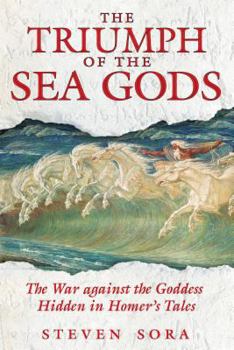The Triumph of the Sea Gods: The War Against the Goddess Hidden in Homer's Tales
Select Format
Select Condition 
Book Overview
An investigation of the geographical incongruities in Homer's epics locates Troy on the coast of Iberia, in a conflict that changed history - Cites the rise in sea level in 1200 B.C. as leading to the invasion and victory of the Atlantean sea people over the goddess-worshipping Trojans who ruled the coasts - Identifies Troia (Troy) as part of a tri-city area that later became Lisbon, Portugal In The Triumph of the Sea Gods , Steven Sora argues compellingly that Homer's tales do not describe adventures in the Mediterranean, but are adaptations of Celtic myths that chronicle an Atlantic coastal war that took place off the Iberian Peninsula around 1200 B.C. It was a war between the pro-goddess Celtic culture that presided over what is now Portugal and the patriarchal culture of the sea-faring Atlanteans. The invasion of the Atlantean sea peoples brought destruction to the entire region stretching from Western Europe's Atlantic border to Egypt, Syria, and Turkey. This was a turning point not only politically but also spiritually. The goddess became demonized, as seen in myths such as Pandora's Box in which woman was seen as the source of evil, not the origin of life, and Homer's tale of the epic Greek and Trojan war, which was triggered by the abduction of a woman. The actual historical struggle described in Homer's stories, Sora explains, occurred during what was the last in a series of rises in sea level that inundated various land masses (Atlantis) and permitted sea passage to areas previously accessible only by land. The "Sea Gods" (Atlanteans) attacked the tri-city region of Troia (Troy), near present-day Lisbon, which, shortly thereafter, fell victim to a devastating series of seaquakes and tsunamis. The war and the subsequent destructive weather broke the power of this seaboard civilization, leading to a wholesale invasion by the sea peoples and the rapid decline of the region's goddess-worshipping culture that had reigned there since Neolithic times. Sora shows how Homer's tales allow the modern world to glimpse this ancient conflict, which has been obscured for centuries.
Format:Paperback
Language:English
ISBN:159477143X
ISBN13:9781594771439
Release Date:June 2007
Publisher:Destiny Books
Length:260 Pages
Weight:0.82 lbs.
Dimensions:0.7" x 6.1" x 8.9"
Customer Reviews
2 ratings
revisionist view of the sources of Homer's Greek epics
Published by Thriftbooks.com User , 17 years ago
Sora places the site of Troy--and thus the sources of Homer's epics the Iliad and the Odyssey--at the western edge of the Iberian peninsula. His provocative view is abundantly supported by etymology, geography, geology, archaeology, and elements of ancient mythology plus a six-and-a-half-page bibliography. The sea god Neptune's trident--a spear or staff with three prongs--is seen as representing the three Iberian cities of Lisbon, Setubal, and Troy. About 1200 BCE, these city-states engaged in a war whose outcome determined the history and culture of the entire Mediterranean region and parts of Europe for centuries. Troy and its allies battled against a group of city-states identified as "Atlantean," the basis for the myth of Atlantis mentioned in Plato's dialogues and elsewhere. One of the most fateful changes brought by the victory of the Atlantean states was the dominance of their patriarchal government and values over the matriarchal of Troy and its allies. Sora develops his fascinating ideas to chart the wanderings of Ulysses after the Trojan War as poetically recounted by Homer in the Odyssey; and also account for the presence of the Etruscans in northern Italy, whose origins continue to baffle archaeologists. Sora has written similar previous challenging, provocative, and enlightening books on the Knights Templars and secret societies in American culture.
Fascinating reading.
Published by Thriftbooks.com User , 17 years ago
Steven Sora's THE TRIUMPH OF THE SEA GODS: THE WAR AGAINST THE GODDESS HIDDEN IN HOMER'S TALES could've been reviewed in our History Shelf section but is featured here for its concurrent attraction to New Age readers. Sora argues here that Homer's tales don't describe the commonly-held Mediterranean scenarios, but are adaptations of pre-Celtic myths detailing an Atlantic coastal war which took place off the Iberian Peninsula around 1200 BCE, and chronicled the rise of the seas as well. Ancient history collections and new age readers alike will find this alternative history description detailing the rise of sea peoples and the decline of the region's goddess-worshipping culture makes for fascinating reading.





